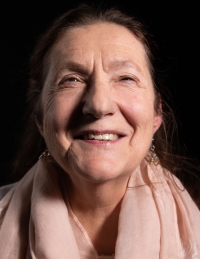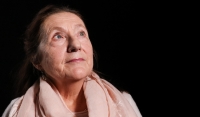Mgr. Olga Anna Markowitz
* 1949
-
“Then I got to know that he had been married in Russia which I did not know. My first question was if he had had children there. And he had had a son. Back then I broke into my father´s safe to read the addresses from that time. There were various legal documents as there was a legal dispute over maintenance and I don´t know what else. There were some disputes up until 1958. I found an address and I wrote to the Soviet council in that area. It was the Moscow area. It was a village, a bigger village. He was supposed to have lived there until 1958 because the address was on the letters. I sent the letter for him with a photo in an envelope and I put that to other envelope with a request for the local Soviet council to find the person and give him the envelope. I was on a camp in summer when the first letter from him came with a photo. It was unbelievable. I was in heaven. I can still remember that there was: 'Dorogaja sestra Olga, pišet těbě tvoj brat Voloďa'.“
-
“I left the academy in 1975 and I started to work at a conservatoire in Teplice. I had to go for an interview. It was in front of a committee and mainly comrades from the Czechoslovak Communist Party spoke there and there were various parties. There were also people from an anti-fascist fighters’ organization. There was a man who fought with my daddy on the front. He was sitting there when they were talking about my cadre record. Suddenly they read there that Olga Markowitzová... although she had had the highest score and even though she had been admitted from the first place, we could not accept her because she was, as far as her cadre was concerned, completely untrustworthy. There was that I claimed allegiance to Zionism and so on. The man stood up and said that he personally knew my father, that they fought together in the first line the whole time and that he was a hero and had state decorations, that he was Svoboda´s personal adjutant and radio officer and the first foreign soldier who had been awarded high Soviet decoration. The man vouched for me and therefore they were worried about causing troubles. They concluded they would admit me, but they would observe me and would be careful to monitor my behaviour. I was there for thirteen years and step by step I could personally experience how it felt to be attacked, followed, offended and so on.”
-
“The years when he returned to Ostrava were the harshest ones, he worked at the regional military administration and then at the city one and had a rank of major or colonel and did paperwork - he recruited recruits and I do not know what else. He was very unhappy there. We did not know that, only when I was older, I understood what horrible things he had been through every day. He confirmed it to me before death. Every day he expected that a car would stop in the street and pick him up. Concerning the family, my mother was a dressmaker and she sewed for several women at home. Of course, she did not have a salon or anything because it was impossible at that time. However, someone reported my mother so, for example, we had house searches at home. Or they summoned father before the street committee, and he was about to suffer a heart attack because the comrades were yelling at him how it was possible that he had left the republic in 1939. Those were horrible moments, saying this to a person who had to go to a Jewish transport. I then understood why nobody could visit us. I could not bring anyone at home, a friend from school or anyone like this. I could not go anywhere.”
-
“I started to think politically at the moment when the Russian occupation came. It was clear then. I was chosen together with my colleague to go to the regional committee to inform them that we protest; the headmaster was afraid, but we were not, and we sang an anthem with our class teacher at the beginning of school year. At that time, I already knew where I belonged and what I wanted and the Czechoslovak Communist Party or anything similar was not it. Of course, I attended pioneer because I imagined that every child should do it. My dad naturally recommended me to go there because at that time he could not imagine me saying somewhere that he had forbidden it to me. He as an independent, a Jew and an officer would have to explain it in the army. He was of course worried about me. Then he always explained it to me that he was most afraid that I would be left alone only with mother and my life would be ruined.”
-
“Then they left the camp because of Heliodor Píka´s appeal to the Czechs to join the Czechoslovak Army in Buzuluk. My father was a speaker of the whole group of about eighty Czechs who wanted to leave. His language skills were the best and he went to negotiate to a nearest city. He wanted to keep those relatively fresh and intelligent Jews who had left Czechia. Then they left for Buzuluk, the story is generally known. Dad was assigned to radio officers and trained to become a radio officer. We went the whole journey from Buzuluk to Prague as a radio officer, later as general Svoboda´s personal radio officer and his personal adjutant during the battle of the Dukla Pass. As an independent and a person who was against that course in his mind. At that time, he was strongly attacked by Reicin, already at the front. I described it in the book. Subsequently, it cost him dramatic turns.”
-
“He got on the historically first transport from Ostrava that took approximately a thousand of Jewish men to Nisko upon San. As it is known, the camp dissolved soon because it was not ready, and they were supposed to build it. He and other two men crawled over the guarded area; it was before the invasion of Russia. He never saw the other two again. He got into Russia and was waiting there approximately one week for a train that a Jewish man who was guarding them on a horse recommended him. He could not stay there, otherwise they would kill him. Se he was waiting somewhere there. He told me himself that he did not understand what had been going on at that time. That the brain completely forgot it. He had no food, nothing. He was hiding somewhere, completely wet, freezing and waiting to hear the train. He managed to arrive by train to Lviv that was crowded with refugees. Then he managed to get with other newcomers from Nisk to the town of Stanyslaviv. He lived there with other young men in a derelict temple. There were, of course, bedbugs, lice and everything else. But they had a feeling that life would not be so dramatical. But the KGB interfered and asked them to accept Russian nationality which they refused. Due to it, they put them in cattle trucks. They did not leave them for a month, they transported them to Siberia for a month.”
-
Full recordings
-
Praha, 22.11.2019
(audio)
duration: 01:45:25
Full recordings are available only for logged users.
I was wearing a Star of David pendant and did not suit the cadre
Anna Markowitz, née Olga Anna Markowitz, was as a respected singer also known by her married surname Olga Štěpánová. She was born on the 25th of November 1949 in Ostrava. Her mother Naděžna, née Spáčilová was a dressmaker, her father Kurt Markovič was a Jew and he was an officer in the Czechoslovak army. He was one of the first Jews that were deported in 1939. He ran away from a labour camp in Nisko upon San to SSSR. He survived the Gulag and fought on the Eastern Front with Svoboda´s Czechoslovak Army Corps. After the Second World War, the communist authorities made it impossible for him to return to his family that he started in SSSR, he could not finish studies of Medicine and he spent the rest of his life worrying about communist oppression. Anna was born into his second marriage. She was very short-sighted from birth with the prognosis of a complete loss of vision. She studied piano and singing at a conservatoire in Ostrava and then at The Academy of Performing Arts in Prague. After the graduate examination she taught at a conservatoire in Teplice where she, according to her memories, struggled with her colleague´s anti-Semitic approaches and also with visual impairment. She left after 13 years and she pursued a career as a solo singer. When she was seventeen, she got to know about her half-brother living in SSSR and she was able to find him. She turned her father´s life story into a book “Medaile za ztracenéo Boha” (“A Medal for Lost God”). She publishes prose and poetry. She lives in Germany and so does her daughter.

